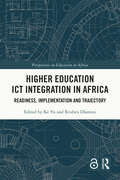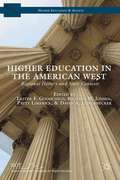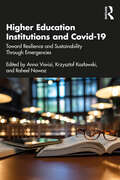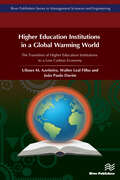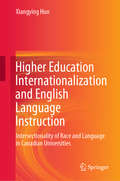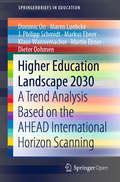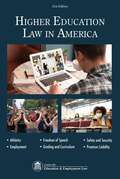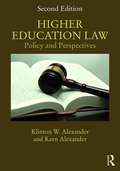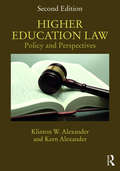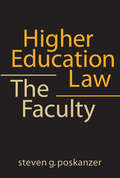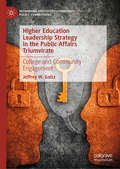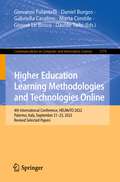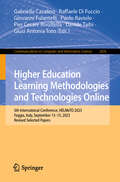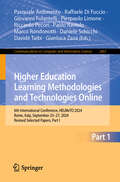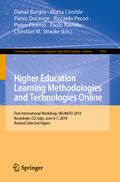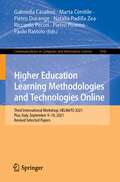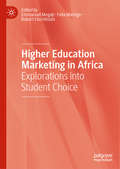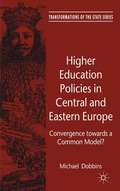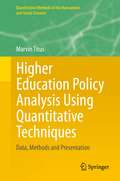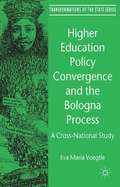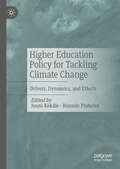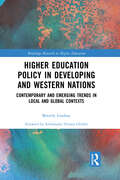- Table View
- List View
Higher Education Hauntologies: Living with Ghosts for a Justice-to-come (Routledge Research in Higher Education)
by Michalinos Zembylas Vivienne Bozalek Dorothee Hölscher Siddique MotalaHigher Education Hauntologies considers how higher education might benefit from thinking about Derrida’s notion of hauntology and its implications for a justice-to-come. It contributes to the imperative to rethink the university across and with/in global geopolitical spaces and, thus, has appeal for both Southern and international contexts. The book includes ideas which push boundaries that previously served higher education teachers and scholars and proposes new imaginaries of higher education. Additionally, the collection makes a contribution to ongoing debates about the epistemological, ethical, ontological and political implications of hauntology in higher education policies and practices, particularly in line with contemporary concerns for more socially just possibilities and visions in higher education. This book will be of great interest for academics, researchers and postgraduate students of posthumanism and new materialism who are looking for new perspectives to engage with, and for those who are concerned about a justice-to-come in education, higher education, and educational theory and policy.
Higher Education ICT Integration in Africa: Readiness, Implementation and Trajectory (ISSN)
by Ke Yu Reuben DlaminiThis multidisciplinary, edited volume examines higher educations’ ICT integration in Africa, contributing a new and inclusive change readiness framework to better understand how to manage ICT or other technological disruptions in resource-restrained contexts.Tackling ICT incorporation in HEIs from different levels, chapters document case studies from countries such as Uganda, South Africa, Rwanda, Eswatini and Zimbabwe to demonstrate both the complexity of integration but also the successes it has enabled and under which conditions. The cases included in this book also exhibit better incorporation of both change content and process, while some cases also make explicit reference to other technology adoption models. Ultimately, the book highlights conceptual and empirical research to inform practices and policy development in Africa, improving multi-level success or change readiness in ICT incorporation in HEIs in Africa.Addressing various gaps in existing literature and proposing innovative solutions like the multilevel change readiness model, this book will therefore be of interest to scholars, researchers and academics in the fields of higher education, ICT integration, and educational technology more broadly.The Open Access version of this book, available at http://www.taylorfrancis.com, has been made available under a Creative Commons Attribution-Non Commercial-No Derivatives (CC-BY-NC-ND) 4.0 license.
Higher Education In The American West
by Lester F. Goodchild Richard W. Jonsen Patty Limerick David A. LonganeckerIn two volumes, editors Lester F. Goodchild, Richard W. Jonsen, Patty Limerick, and David A. Longanecker, working with eminent historians, policy analysts, and university leaders, provide a comprehensive overview of the role of education in the American West and the relationships between individual states and their institutions of higher learning. The volumes examine the states from North Dakota and the mountain West to Alaska and California, treating each both individually and as a part of the region; they provide concise, detailed information about each one's history, development, and current policies. One volume spans two hundred years of history, while its companion focuses on clarifying seven key public policy challenges facing higher education in the West today. Together, they make essential reading for higher education policymakers, scholars, and anyone who wants to know what the relationship between states and universities in the West has been and what its future might be.
Higher Education Institutions and Covid-19: Toward Resilience and Sustainability Through Emergencies
by Anna Visvizi Krzysztof Kozłowski Raheel NawazOffering insights into the adaptational strategies that were employed by higher education institutions worldwide during the Covid-19 pandemic, this volume considers the lasting effects of adaptation and change, as well as the perception of universities’ role in society and desired ways of operating. Nearly overnight, the pandemic forced university leaders and faculty across the world to switch to remote models, not only of teaching and learning but also of managing an entire institution. This book recognizes how the scale of challenges as well as the range of measures specific universities had to undertake was uneven, with some being better equipped than the others. Using a selection of international case studies, it offers an insight into strategies employed by institutions worldwide to navigate the crisis, and highlights the targets and objectives addressed by them during these processes. In so doing, it offers invaluable lessons for the years to come. An indispensable study into strategies that result in resilience and sustainability for universities, this book is essential reading for scholars of education, pedagogy, and organizational change in the higher education sector, as well as educational leaders around the world.
Higher Education Institutions in a Global Warming World
by Walter Leal Filho Ulisses M. Azeiteiro João Paulo DavimHigher Education Institutions in a Global Warming Worldaims to contribute to the global debate on Sustainability in Higher Education, and in particular to the transition of Higher Education Institutions to a Low Carbon Economy.The transition of Higher Education Institutions towards a Low Carbon Economy is aligned with the Paris Agreement, and with Sustainable Development Goal 13: Take urgent action to combat climate change and its impacts. It is also consistent with the European Commission´s Climate strategies and targets and with the aims of the European Climate Change Program.Transitioning to a low carbon economy represents one of the most significant and urgent challenges we are facing, and Universities have a critical role to play in fostering a low carbon future, especially by developing innovative solutions.
Higher Education Institutions in the EU: Between Competition and Public Service
by Andrea GideonThis book investigates the impact of EU law and policy on the Member States' higher education institution (HEI) sectors with a particular emphasis on the exposure of research in universities to EU competition law. It illustrates how the gradual application of EU economic law to HEIs which were predominantly identified as being within the public sector creates tensions between the economic and the social spheres in the EU. Given the reluctance of the Member States to openly develop an EU level HEI policy, these tensions appear as unintended consequences of the traditional application of the EU Treaty provisions in areas such as Union Citizenship, the free movement provisions and competition policy to the HEI sector. These developments may endanger the traditional non-economic mission of European HEIs. In this respect, the effects of Union Citizenship and free movement law on HEIs have received some attention but the impact of EU competition law constitutes a largely unexplored area of research and this book redresses that imbalance. The aim of the research is to show that intended and unintended consequences of the EU economic constitution(s) are enhanced by a parallel tendency of Member States to commercialise formerly public sectors such as the HEI sector. The book investigates the potential tensions through doctrinal analysis and a qualitative study focussing on the exposure of HEI research to EU competition law as an under-researched example of exposure to economic constraints. It concludes that such exposure may compromise the wider aims that research intensive universities pursue in the public interest. Andrea Gideon is a Postdoctoral Research Fellow at the Centre for Law & Business (National University of Singapore) for which she has suspended her position as Lecturer in Law at the University of Liverpool. In her current project she is investigating the application of competition law to public services in ASEAN. Her previous research concerned tensions between the economic and the social in the EU with a focus on EU competition law in which research area she earned her PhD at the University of Leeds in 2014.
Higher Education Internationalization and English Language Instruction: Intersectionality of Race and Language in Canadian Universities
by Xiangying HuoThis book offers new understanding of the implications of pluralism and of transnational movements to higher education and the construct of a “native speaker” within contemporary globalization processes. Theoretically, it calls for a revisioned English as an International Language (EIL) pedagogy and a wider acceptance of EIL and of World Englishes. It challenges the postsecondary education sector to change the discourse around language proficiency to one that engages the “pluralism of English.” As for the applied significance, the book contributes to the work on neo-racism which means racism goes beyond color to stereotypic foreign cultures, nationalities, and exotic accents based on cultural distinctions instead of merely skin differences. The book contributes to higher education policy and practice, pushing a revisioning of ESL in conceptual and pedagogical ways, such as designing more culturally oriented curriculum, implementing culturally responsive pedagogy, and valuing the teaching proficiency more than the language proficiency.
Higher Education Landscape 2030: A Trend Analysis Based on the AHEAD International Horizon Scanning (SpringerBriefs in Education)
by Martin Ebner Dominic Orr Maren Luebcke J. Philipp Schmidt Markus Ebner Klaus Wannemacher Dieter DohmenThis open access Springer Brief provides a systematic analysis of current trends and requirements in the areas of knowledge and competence in the context of the project “(A) Higher Education Digital (AHEAD)—International Horizon Scanning / Trend Analysis on Digital Higher Education.” It examines the latest developments in learning theory, didactics, and digital-education technology in connection with an increasingly digitized higher education landscape. In turn, this analysis forms the basis for envisioning higher education in 2030.Here, four learning pathways are developed to provide a glimpse of higher education in 2030: Tamagotchi, a closed ecosystem that is built around individual students who enter the university soon after secondary education; Jenga, in which universities offer a solid foundation of knowledge to build on in later phases; Lego, where the course of study is not a monolithic unit, but consists of individually combined modules of different sizes; and Transformer, where students have already acquired their own professional identities and life experiences, which they integrate into their studies. In addition, innovative practice cases are presented to illustrate each learning path.
Higher Education Law in America
by Center for Education & Employment LawHigher Education Law in America brings together in one volume the latest updates covering school operations and school finance, athletics and student activities, discrimination against students, freedom of speech and school liability. You’ll also receive applicable parts of the Constitution and a list of Supreme Court higher education cases.
Higher Education Law: Policy And Perspectives
by Kern Alexander Klinton AlexanderThis fully revised and updated textbook weaves law into its historical, political, and sociological context, while providing clear explanation of the law as it applies to American colleges and universities. This text draws exclusively on federal and state cases emerging from campuses and includes helpful pedagogical elements--such as chapter outlines, questions for discussion, side bars, text boxes, research aids, and summation of law--to equip readers with the tools and knowledge to effectively respond in an environment of increasing litigation. Addressing a gap in the literature, this new edition provides a comprehensive and accessible understanding of the latest laws relevant to higher education and student affairs administrators.
Higher Education Law: Policy and Perspectives
by Kern Alexander Klinton W. AlexanderThis fully revised and updated textbook weaves law into its historical, political, and sociological context, while providing clear explanation of the law as it applies to American colleges and universities. This text draws exclusively on federal and state cases emerging from campuses and includes helpful pedagogical elements--such as chapter outlines, questions for discussion, side bars, text boxes, research aids, and summation of law--to equip readers with the tools and knowledge to effectively respond in an environment of increasing litigation. Addressing a gap in the literature, this new edition provides a comprehensive and accessible understanding of the latest laws relevant to higher education and student affairs administrators. New In This Edition: Explanation and streamlining of old case law. New cases throughout covering recent developments in: student loan debt, student safety, Internet speech, affirmative action, discrimination, Greek life, issues relating to new technology, non-faculty employees, campus police, and athletics. Revised explanation on student and college costs. Expanded examination of the idea of academic freedom
Higher Education Law: The Faculty
by Steven G. Poskanzer"Do we need to talk to our lawyers about this?" "What do the attorneys say?" "Why didn't you get the lawyers involved before now?"Just about every department chair and dean, certainly every provost and president, and an ever-increasing number of faculty find themselves asking—or being asked—such questions. Dealing with issues ranging from academic freedom to job security and faculty discipline, lawyers, legal requirements, and lawsuits has become an established part of the apparatus of American higher education. Higher Education Law was written to help faculty and administrators navigate critical legal issues and avoid potential legal pitfalls. Drawing on his experience as university counsel, administrator, and teacher at a number of institutions, Steven G. Poskanzer explains the law as it pertains to faculty activities both inside and outside the academy, including faculty roles as scholars, teachers, and members of institutional communities, as well as employees and public citizens. In each of these areas, he expands his discussion of cases and decisions to set out his own views both on the current status of the law and how it is likely to evolve.
Higher Education Leadership Strategy in the Public Affairs Triumvirate: College and Community Engagement (Rethinking University-Community Policy Connections)
by Jeffrey W. GoltzThis book provides a comprehensive approach for colleges rethinking their community policy connections. From a ‘pracademic’ perspective, it introduces a new paradigm for contemporary college and community connections through the evolution of research, scholarship and experience, and the application of the Public Affairs discipline from Higher Education Leadership. The book explains how the public affairs forces of Community, Organization, and Administration offer a unique combination of concepts and theory that can transform practice, develop innovation, strengthen communities, and transform lives through a college partnering in a variety of community projects. The book’s defined ethical composition institutes leadership in the public realm, within the Public Affairs Triumvirate; and its discussion of the ‘science to service to philosophy’ will advance higher education strategy scholarship, creating new ideas for how academia and communities can create sustained connections and partnerships for solving problems in any community.
Higher Education Learning Methodologies and Technologies Online: 4th International Conference, HELMeTO 2022, Palermo, Italy, September 21–23, 2022, Revised Selected Papers (Communications in Computer and Information Science #1779)
by Daniel Burgos Marta Cimitile Davide Taibi Gabriella Casalino Giovanni Fulantelli Giosuè Lo BoscoThis book constitutes the thoroughly refereed post-conference proceedings of the 4th International Conference on Higher Education Learning Methodologies and Technologies Online, HELMeTO 2022, held in Palermo, Italy, in September 2022. The 59 revised papers presented were carefully reviewed and selected from a total of 126 submissions. The papers present recent research on challenges of implementing emerging technology solution for online, online learning pedagogical frameworks, online learning technologies in practice, online learning strategies and resources, etc.
Higher Education Learning Methodologies and Technologies Online: 5th International Conference, HELMeTO 2023, Foggia, Italy, September 13–15, 2023, Revised Selected Papers (Communications in Computer and Information Science #2076)
by Paolo Raviolo Davide Taibi Gabriella Casalino Raffaele Di Fuccio Giusi Antonia Toto Giovanni Fulantelli Pier Cesare RivoltellaThis volume constitutes the refereed proceedings of the 5th International Workshop, HELMeTO 2023, held in Foggia, Italy, during September 13–15, 2023. The 52 full papers were carefully reviewed and selected from 107 submission. They are categorized in the following sections: Online pedagogy and learning methodologies and Learning technologies data analytics and educational big data mining and their applications, Smart Systems for Context-aware Education, Emotions and Art in Higher Distance Education and Performing art based methodology to improve online learning experiences, E learning for providing augmented mathematics education at University level, SuperCyberKids the importance of promoting Cybersecurity Education among teacher education students, Effects of High performance Artificial Intelligence systems and Immersive Technologies in Education, The Future of Learning Exploring the Intersection of Posthumanism E Health Technologies and Artificial Intelligence in Education Innovations, Technology based learning interventions in higher education for combating inequalities and increasing the psychological well being of youngsters, Innovative Inclusive University, Beyond borders: exploring immersive environments and new didactic approaches in higher education, Learning Technologies and Faculty Development in the digital framework.
Higher Education Learning Methodologies and Technologies Online: 6th International Conference, HELMeTO 2024, Rome, Italy, September 25–27, 2024, Revised Selected Papers, Part I (Communications in Computer and Information Science #2467)
by Riccardo Pecori Paolo Raviolo Pierpaolo Limone Davide Taibi Raffaele Di Fuccio Giovanni Fulantelli Pasquale Ardimento Marco Rondonotti Daniele Schicchi Gianluca ZazaThe two-volume set CCIS 2467 and 2468 constitutes the refereed post-conference proceedings of the 6th International Conference on Higher Education Learning Methodologies and Technologies Online, HELMeTO 2024, held in Rome, Italy, during September 25–27, 2024. The 46 revised full papers presented in these proceedings were carefully reviewed and selected from 101 submissions. The papers are organized in the following topical sections: Part I: Artificial Intelligence in Education – Emerging Technologies and Digital Transformation in Education.Part II: Inclusion, Well-being, and Student Support – Educational Policy, Ethics, and Teacher Professional Development.
Higher Education Learning Methodologies and Technologies Online: First International Workshop, HELMeTO 2019, Novedrate, CO, Italy, June 6-7, 2019, Revised Selected Papers (Communications in Computer and Information Science #1091)
by Daniel Burgos Riccardo Pecori Marta Cimitile Pietro Ducange Pietro Picerno Paolo Raviolo Christian M. StrackeThis book constitutes the thoroughly refereed post-conference proceedings of the First International Workshop on Higher Education Learning Methodologies and Technologies Online, HELMeTO 2019, held in Novedrate, Italy, in June 2019. The 15 revised full papers and 2 short papers presented were carefully reviewed and selected from a total of 39 submissions. The papers are organized in topical sections on online pedagogy and learning methodologies; learning technologies, data analytics and educational big data mining as well as their applications; the challenge of online sport and exercise sciences university programs.
Higher Education Learning Methodologies and Technologies Online: Third International Workshop, HELMeTO 2021, Pisa, Italy, September 9–10, 2021, Revised Selected Papers (Communications in Computer and Information Science #1542)
by Riccardo Pecori Marta Cimitile Pietro Ducange Pietro Picerno Paolo Raviolo Gabriella Casalino Natalia Padilla ZeaThis book constitutes the thoroughly refereed post-conference proceedings of the Third International Workshop on Higher Education Learning Methodologies and Technologies Online, HELMeTO 2021, held in Pisa, Italy, in September 2021. Due to the COVID-19 pandemic the conference was held online. The 26 revised full papers and 3 short papers presented were carefully reviewed and selected from a total of 65 submissions. The papers present recent research on challenges of implementing emerging technology solution for online, online learning pedagogical frameworks, facing COVID19 emergency in higher education teaching and learning, online learning technologies in practice, online learning strategies and resources, etc.
Higher Education Marketing in Africa: Explorations into Student Choice (Routledge Studies In Marketing Ser.)
by Emmanuel Mogaji Felix Maringe Robert Ebo HinsonThis book explores the key players, challenges and policies affecting higher education in Africa. It also explores the marketing strategies and the students’ selection process, providing theoretical and practical insights into education marketing in Africa. In particular, it focuses on the competition for students. The growing number of student enrolments, the public sector’s inability to meet the ever-increasing demands and new private universities springing up mean that it is essential for universities to identify their market and effectively communicate their messages. Although there has been substantial theoretical research to help shed light on students’ choices and universities' marketing strategies, little work has been undertaken on higher education in the African context. Filling that gap in the research, while at the same time acknowledging the regional differences in Africa, this book offers empirical insights into the higher education market across the continent.
Higher Education Personal Tutor’s and Advisor’s Companion: Translating Theory into Practice to Improve Student Success (Higher Education)
by Dave Lochtie Andrew Stork Ben W WalkerProfessional learning and development for higher education personal tutors and academic advisors. With contributions from 50 practitioners from across the sector, this text examines the key themes, theories and concepts relevant to personal tutors and academic advisors and translates these into real-world practice. Case study narratives from a range of settings demonstrate how student learning and outcomes can be improved, and related critical thinking activities encourage reflection on how these learnings can be applied in specific contexts. The book provides invaluable insights and support for all personal tutors and academic advisors, enabling practitioners to learn from each other, develop innovative ideas, and feel part of a community of learning.Please also see Effective Personal Tutoring in Higher Education for the themes on which the case studies in this collection are based.
Higher Education Policies in Central and Eastern Europe
by Michael DobbinsA political science perspective on higher education reform in Central and Eastern Europe. Examines the impact of historical institutions and transnational networking on institutions of higher education and assesses whether Poland, the Czech Republic, Bulgaria and Romania are converging towards a common model of market-based governance.
Higher Education Policy Analysis Using Quantitative Techniques: Data, Methods and Presentation (Quantitative Methods in the Humanities and Social Sciences)
by Marvin TitusThis textbook introduces graduate students in education and policy research to data and statistical methods in state-level higher education policy analysis. It also serves as a methodological guide to students, practitioners, and researchers who want a clear approach to conducting higher education policy analysis that involves the use of institutional- and state-level secondary data and quantitative methods ranging from descriptive to advanced statistical techniques. This book is unique in that it introduces readers to various types of data sources and quantitative methods utilized in policy research and in that it demonstrates how results of statistical analyses should be presented to higher education policy makers. It helps to bridge the gap between researchers, policy makers, and practitioners both within education policy and between other fields.Coverage includes identifying pertinent data sources, the creation and management of customized data sets, teaching beginning and advanced statistical methods and analyses, and the presentation of analyses for different audiences (including higher education policy makers).
Higher Education Policy Convergence and the Bologna Process: A Cross-National Study (Transformations of the State)
by Eva Maria VögtleWhat are the principal drivers of recent higher education reforms? This study investigates whether the soft governance mechanism of transnational communication has evoked cross-national policy harmonization. Results suggest that the Bologna Process has triggered substantial policy harmonization beyond general policy convergence.
Higher Education Policy for Tackling Climate Change: Drivers, Dynamics, and Effects
by Rómulo Pinheiro Jouni KekäleThis book investigates the roles of universities and other types of higher education institutions in tackling climate change. Climate change is arguably the most pressing concern of our era, and one of the biggest challenges humanity has faced. In line with this, there is a firm belief that higher education institutions are among the key actors in the fight against climate change, especially in providing innovations and new technologies to mitigate the issue. A steadily growing number of universities across the world are playing a leading role in the fight for a sustainable world. Bringing together scholars from around the world, this volume adopts an interdisciplinary approach to investigate the effects resulting from the complex interplay between national, regional and global higher education policy initiatives aimed at tackling climate change. It will appeal to all those interested in climate change, science and innovation, public policy and higher education governance. Chapters 1, 2 and 8 are available open access under a Creative Commons Attribution 4.0 International License via link.springer.com.
Higher Education Policy in Developing and Western Nations: Contemporary and Emerging Trends in Local and Global Contexts (Routledge Research in Higher Education)
by Beverly LindsayRecognizing that institutes of higher education function simultaneously in local and global contexts, this volume explores the applications of domestic and global policies in a range of industrialized nations in North America and Australia, and developing ones of Brazil, Indonesia, Myanmar, and in Southern Africa and the Caribbean The chapters focus on policies relating to global matters such as diversity, STEM (Science, Technology, Engineering, and Mathematics) innovations, and development amid natural disasters and conflicts. In each case, authors consider how policies were envisioned, how they compare to the realities of implementation, and how far they have been successfully supported by the communities and translated into legislations and formal or informal programs. Based upon decades of research and executive positions by senior scholars and perspectives of emerging professionals, the volume concentrates on motifs that portray relationships among policies and comparative analysis that reveals the need for global collaborations. This important book will be of great interest to researchers, scholars, postgraduates, and government and philanthropic professionals in the fields of higher education, public and educational policy, comparative education, and international affairs.

